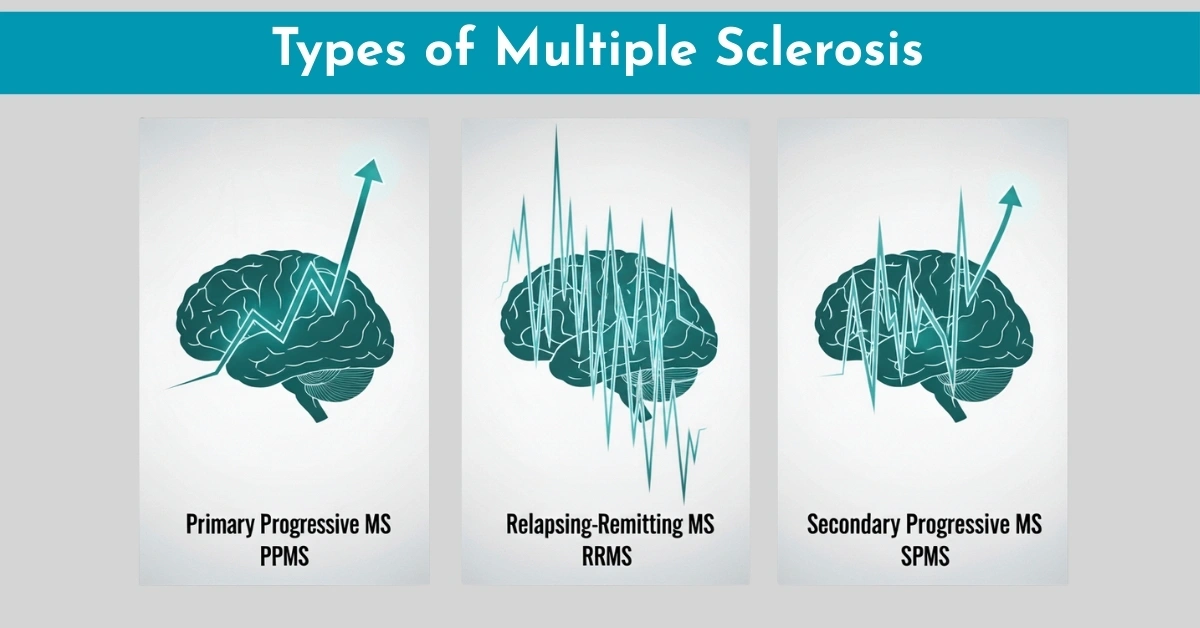
Multiple Sclerosis (MS) is a chronic neurological disease that affects the central nervous system (CNS), where the body’s immune system attacks its own nerve fibres and myelin (the protective layer around nerve fibers), mainly in your brain and spinal cord. And if you are wondering, ‘Is MS Hereditary?’, while not always hereditary, having this disease in your inheritance increases the chances of you getting it.
Maintaining a healthy lifestyle with adequate vitamin D levels, a balanced diet, and avoiding smoking can help reduce risks. Let’s look at MS, its types, contributing factors, prevention tips (especially for couples with MS looking to have a baby), and more.
Define Multiple Sclerosis
MS is an autoimmune disease where the immune system attacks the myelin, a fatty substance that insulates the nerve fibers in the CNS. This results in inflammation, scarring, and disruption in the transmission of nerve signals.
More common in women than men, with a 2-3 times higher risk for women. MS is most often diagnosed between the ages of 20 and 40.
Types of Multiple Sclerosis:
- Relapsing-Remitting MS (RRMS): Most common form, marked by flare-ups followed by periods of recovery.
- Primary Progressive MS (PPMS): Gradual worsening from the onset without clear periods of remission.
- Secondary Progressive MS (SPMS): Follows RRMS after a period of relapsing-remitting disease.

Genetic Factors in MS
MS is not directly inherited in a Mendelian fashion, but genetic susceptibility can influence your risk.
- Family history: If a first-degree relative (parent, sibling) has MS, your risk increases. However, most people with MS do not have a family history of the disease.
- Inherited MS genes: Certain genetic variants (e.g., HLA-DRB1 gene) are linked to MS susceptibility. However, these genes alone are not enough to cause MS; they work alongside environmental triggers.
Hereditary Patterns of Multiple Sclerosis
While MS may be experienced without the effects of inheritance as well. Inheritance typically has strong effects:
- Increased Risk: Siblings of someone with MS have a higher risk compared to the general population.
- Generational Passing: While MS can run in families, it does not necessarily skip generations. Environmental and lifestyle factors also affect the likelihood of disease manifestation.
Did you know?
A simple at home Pharmacogenomics test (PGx test) from RPh LABS can help your doctor tailor both, your drug and dosage based on your genetic makeup – minimizing adverse effects while increasing efficacy.
Multiple Sclerosis Contributing Factors
The causes of MS are complex, and while some risk factors are genetic, environmental influences also play a crucial role. Some of the factors that may contribute to the occurrence of Multiple Sclerosis (MS) are as follows:
1. Environmental Triggers:
- Vitamin D deficiency: Low levels of vitamin D have been linked to a higher risk of MS. People living in areas with limited sunlight, especially in northern latitudes, are at greater risk.
- Viral infections: Infections such as the Epstein-Barr virus (EBV) have been linked to the development of MS.
- Smoking: Smoking increases the risk of developing MS and can accelerate its progression in those already diagnosed.
2. Lifestyle Choices:
- Obesity: Studies show that obesity, particularly during adolescence, may increase the likelihood of developing MS.
- Diet: While no specific diet has been proven to prevent MS, a balanced diet with adequate vitamin D and omega-3 fatty acids may help in reducing risks.
A study shared by MS Society suggests that smoking not only increases your chances of getting MS but can also worsen your symptoms.
Passing Multiple Sclerosis to Your Baby
Parents with MS planning to have a baby need to be cautious, especially the mother more:
Parental Influence
The risk of passing on MS to your child is influenced by both maternal and paternal genetics, but the mother’s MS seems to have a stronger genetic link to the child’s risk. This is because of the X chromosome involvement in MS, as women have two X chromosomes compared to men’s one.
MS Transmission Risk — Mother vs. Father: If the mother has MS, the risk to her child is slightly higher compared to if the father has MS. However, the overall risk remains low.
Precautionary Measures for Parents Planning a Baby
Genetic counseling is suggested to parents with MS or a family history of MS. This helps them understand their risks and the probability of passing the condition on to their baby. Moreover, if a child is born into a family with MS, early monitoring can help in early diagnosis and intervention, should any signs of MS appear later in life.
Natural Remedies for Multiple Sclerosis
While medical treatments are essential for managing MS, natural remedies can also support symptom management and improve quality of life. Here are a few examples:
- Vitamin D: Research suggests that adequate vitamin D levels may help in reducing MS relapse rates. You can get vitamin D through sunlight exposure and supplements.
- Omega-3 Fatty Acids: Found in fish oil, omega-3 fatty acids have been studied for their potential anti-inflammatory properties, which could benefit MS patients.
- Turmeric (Curcumin): Curcumin, the active compound in turmeric, has anti-inflammatory properties and may help reduce MS symptoms like inflammation and pain.
- Cayenne Pepper: Known for its pain-relieving properties, some studies suggest Cayenne pepper can alleviate nerve pain in MS patients.
- Yoga and Meditation: Regular yoga and meditation can reduce stress, a known MS trigger, and improve muscle strength and flexibility.
Note: Do you know that Lymphedema is becoming more common in the USA, causing long-term swelling and discomfort? The RPH report analyses whether this condition is hereditary (primary lymphedema) or acquired (secondary lymphedema) — click to explore detailed insights.

Conclusion
Multiple Sclerosis (MS) is a chronic disease triggered by both genetic and environmental factors. If you have this disease in your genes, smoking can be your worst enemy; it cannot only increase the risk of you getting it but can also worsen the symptoms.
Although having a family member with MS increases the likelihood of developing the disease, it is not entirely hereditary. Maintaining a healthy lifestyle (explained above), regular medical check-ups, and consulting genetic counsellors if planning a family are the best ways to manage the risk.
Frequently Asked Questions
MS is not strictly hereditary but genetic factors can increase the risk. Environmental triggers, such as lack of sunlight, also play a key role.
Smoking, obesity, and vitamin D deficiency are all major lifestyle factors linked to a higher MS risk.
Early signs can include dizziness, numbness, vision problems, weakness, confusion or even memory loss. If you notice such signs, consider discussing with your healthcare specialist.
While there is no cure for MS, treatments can help manage symptoms and slow progression.
Yes, vitamin D, omega-3 fatty acids, turmeric, and cayenne pepper are natural remedies that may help manage MS symptoms. Additionally, yoga and meditation can provide mental and physical relief.
Disclaimer: This blog is for informational purposes only and does not constitute medical advice. While we strive for accuracy, errors or omissions may occur. Moreover, some images in this blog may be AI-generated or for illustrative purposes only.



Leave a Reply